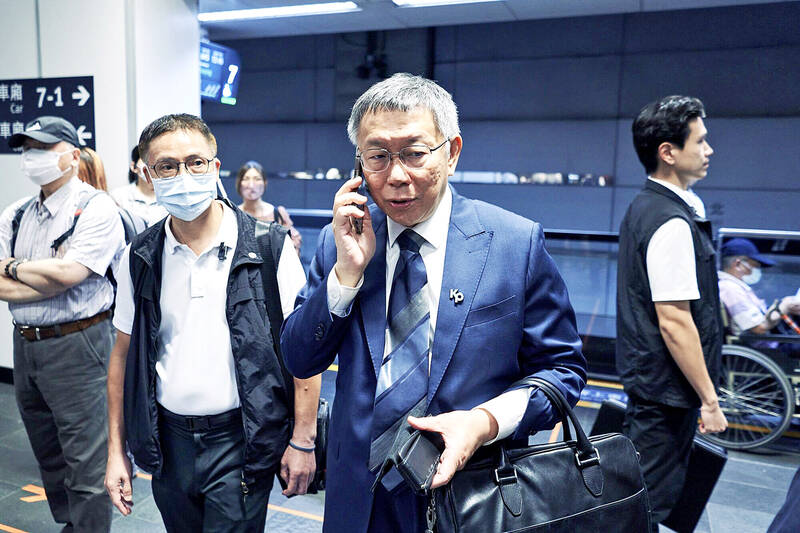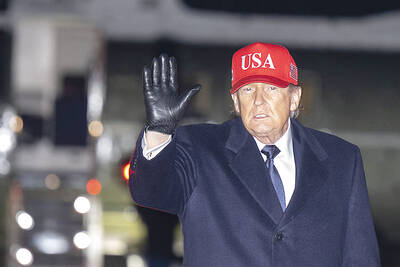Taiwan has no choice but to maintain the “status quo,” and as such, must prioritize “deterrence and communication” in its approach to Beijing, Taiwan People’s Party (TPP) Chairman and presidential candidate Ko Wen-je (柯文哲) said.
In a Bloomberg TV interview that aired on Thursday, Ko said that for the time being, maintaining the cross-strait “status quo” is “the only choice we have,” since “the US won’t let Taiwan unify with China, and China won’t let Taiwan become independent.”
“There’s no point in even talking about unification or independence right now because you can’t achieve either,” he said.

Photo: An Rong Xu, Bloomberg
Asked how he would try to defuse Taiwan’s currently tense relations with China, the former Taipei mayor said he would be guided by the principles of “deterrence and communication.”
Credible deterrence is necessary for Taiwan to be able to effectively negotiate with China, while communication is needed to reduce hostility and lower the risk of miscommunication that could lead to war, he said.
Elaborating on his national defense views, Ko said he supported increasing the defense budget to 3 percent of Taiwan’s GDP — higher than the record 2.5 percent the government has requested in next year’s budget proposal.
Ko said that the Democratic Progressive Party (DPP), despite its habit of “opposing China every day,” has failed to adequately equip Taiwan’s military and has spent defense funds in a “reckless” manner.
For the defense of an island nation like Taiwan, the priorities should be cybersecurity, the air force, the navy and then the army, in that order, Ko said.
“To be honest, I don’t know why Taiwan is buying M1 Abrams tanks. Those tanks can’t even be driven across a lot of our bridges. The defense budget needs to be increased, but the way it is distributed needs to be rational,” Ko said.
Ko was also asked for his view on the so-called “1992 consensus” — a term that former Mainland Affairs Council chairman Su Chi (蘇起) in 2006 admitted making up in 2000, referring to a tacit understanding between the Chinese Nationalist Party (KMT) and the Chinese Communist Party that both sides of the Taiwan Strait acknowledge that there is “one China,” with each side having its own interpretation of what “China” means.
In response, Ko said that the consensus has been “stigmatized” in Taiwan and that he would deal with the issue “pragmatically” and not get stuck in disputes over terminology.
“When China asks if we accept the ‘92 consensus,’ the DPP government directly says ‘no.’ My answer would be: ‘There doesn’t seem to be a market for this in Taiwan. Should we change the name of the term?’” he said.
On the issue of China more broadly, Ko said he believed Chinese President Xi Jinping (習近平) was busy dealing with internal problems like high unemployment and an economic bubble, and that Taiwan was not “near the top of his list.”
In such circumstances, Taiwan should focus on avoiding confrontation and not “stick [its] neck out,” he said, adding that “you don’t want to be your enemy’s No. 1 goal.”

Taiwan has received more than US$70 million in royalties as of the end of last year from developing the F-16V jet as countries worldwide purchase or upgrade to this popular model, government and military officials said on Saturday. Taiwan funded the development of the F-16V jet and ended up the sole investor as other countries withdrew from the program. Now the F-16V is increasingly popular and countries must pay Taiwan a percentage in royalties when they purchase new F-16V aircraft or upgrade older F-16 models. The next five years are expected to be the peak for these royalties, with Taiwan potentially earning

STAY IN YOUR LANE: As the US and Israel attack Iran, the ministry has warned China not to overstep by including Taiwanese citizens in its evacuation orders The Ministry of Foreign Affairs (MOFA) yesterday rebuked a statement by China’s embassy in Israel that it would evacuate Taiwanese holders of Chinese travel documents from Israel amid the latter’s escalating conflict with Iran. Tensions have risen across the Middle East in the wake of US and Israeli airstrikes on Iran beginning Saturday. China subsequently issued an evacuation notice for its citizens. In a news release, the Chinese embassy in Israel said holders of “Taiwan compatriot permits (台胞證)” issued to Taiwanese nationals by Chinese authorities for travel to China — could register for evacuation to Egypt. In Taipei, the ministry yesterday said Taiwan

‘LIKE-MINDED PARTNER’: Tako van Popta said it would be inappropriate to delay signing the deal with Taiwan because of China, adding he would promote the issue Canadian senators have stressed Taiwan’s importance for international trade and expressed enthusiasm for ensuring the Taiwan-Canada trade cooperation framework agreement is implemented this year. Representative to Canada Harry Tseng (曾厚仁) in an interview with the Central News Agency (CNA) said he was increasingly uneasy about Ottawa’s delays in signing the agreement, especially as Ottawa has warmed toward Beijing. There are “no negotiations left. Not only [is it] initialed, we have three versions of the text ready: English, French and Mandarin,” Tseng said. “That tells you how close we are to the final signature.” Tseng said that he hoped Canadian Prime Minister Mark Carney

The US’ joint strikes with Israel on Iran dismantled a key pillar of China’s regional strategy, removing an important piece in Beijing’s potential Taiwan Strait scenario, said Zineb Riboua, a senior researcher at the Hudson Institute’s Center for Middle East Peace and Security. In an article titled: “The Iran Question Is All About China,” Riboua said that understanding the Iran issue in the context of China’s “grand strategy” is essential to fully grasp the complexity of the situation. Beijing has spent billions of dollars over the years turning Iran into a “structural strategic asset,” diverting US military resources in the